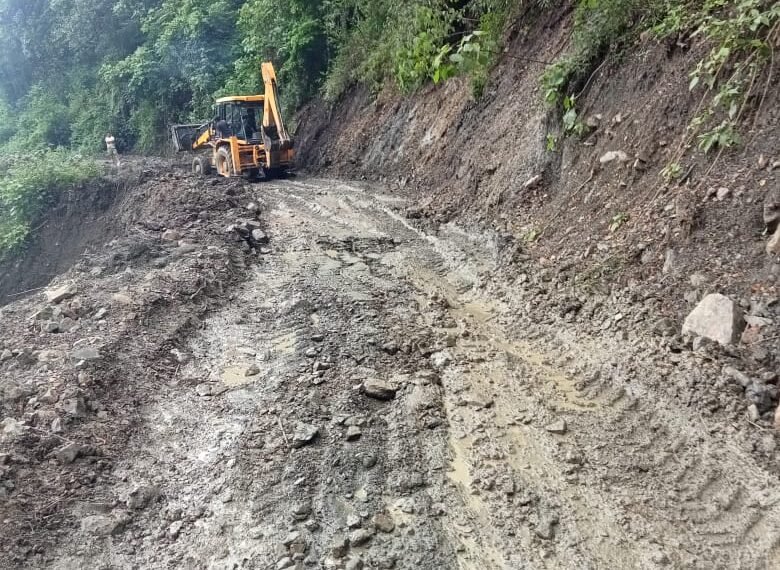The Kuki-Zo Council (KZC) has strongly refuted allegations labeling German-Tiger and Singheu roads as “drug corridors,” asserting they were emergency lifelines built under siege.
BY PC Bureau
July 20, 2025: The Kuki-Zo Council (KZC) has trashed allegations that two key inter-district roads—German-Tiger Road and Singheu Road—are being used as drug corridors, calling the accusations baseless, malicious, and politically motivated.
In a press release, the Council categorically denied the claims being circulated by what it described as “certain Meitei groups,” asserting that these routes are “humanitarian lifelines” constructed out of sheer necessity during the ongoing ethnic conflict in Manipur.
“Let it be made clear: the German-Tiger Road and Singheu Road symbolize resilience, not criminality,” said Ginza Vualzong, Secretary for Information & Publicity, KZC.
Following the outbreak of ethnic violence on May 3, 2023, large parts of Manipur became dangerously inaccessible for the Kuki-Zo community, especially routes passing through Meitei-dominated areas. The violence and the resulting blockade isolated districts like Churachandpur, Kangpokpi, Chandel, and Tengnoupal, cutting off movement, trade, and access to medical services.
READ: Supreme Court to Hear `Explosive’ Biren Audio Case Tomorrow
To counter this isolation, Kuki-Zo civil society organizations reportedly revived and upgraded an old inter-village track between Churachandpur and Kangpokpi, which came to be known as the German-Tiger Road. Meanwhile, with Sugnu becoming inaccessible due to the conflict, the Singheu route became the only viable path to connect southern districts with the northern hills.
“These roads were never commercial. They were born out of a community-led initiative to survive blockades, transport school children and patients, and maintain some semblance of inter-district connectivity,” the KZC noted.
The KZC claims that branding these humanitarian routes as “drug corridors” is a deliberate political strategy to criminalize the Kuki-Zo people, isolate them further, and malign their grassroots initiatives.
The timing of the allegations has raised eyebrows, particularly as it coincides with mounting attention on the Biren Audio Tape case—a controversy that has allegedly implicated state authorities in unlawful surveillance and militia collusion. The Council believes that the drug route narrative could be an attempt to divert attention from more pressing questions of governance and accountability.
German-Tiger Road and Singheu Road Are Humanitarian Lifelines, Not a Drug Corridor
The Kuki-Zo Council (KZC) strongly condemns the baseless and malicious accusations being circulated by certain Meitei groups branding the German-Tiger Road and Singheu Road as
“drug routes.” These… pic.twitter.com/XYhDZqJk6h— Astor (KUKI KA PARIVAR) (@Khulkonns_3382) July 20, 2025
“This tactic may also reflect a broader political effort to shift discourse away from the unfolding Biren Audio Tape case,” the press note reads.
The Council has appealed directly to the central government to dismiss the allegations, emphasizing that both roads are crucial district-level arteries, not trafficking routes. It urged Delhi to assist in upgrading and securing the roads rather than undermining their existence through speculative accusations.
READ: Part 3: A Roadmap for Green Farming in the Northeast Hills
“Any effort to disrupt the connectivity of the Kuki-Zo community clearly reflects a deeper intent to marginalize and dismantle the Kuki-Zo people,” the KZC warned.
This controversy comes amid rising concerns about the weaponization of infrastructure in Manipur’s ethnic crisis. Roads, bridges, and checkpoints have all become points of contention, often split along ethnic lines. There have also been documented cases where relief convoys were denied passage and ambulances were blocked, making alternate humanitarian routes like German-Tiger Road essential for survival.
Observers say the controversy also highlights the larger trust deficit between communities, and the inability—or unwillingness—of the state administration to ensure safe and equal access to all its citizens.
As Manipur continues to reel from over two years of ethnic strife, the debate over German-Tiger and Singheu Roads underscores the community’s fight for survival amid blockades and displacement. Whether the central government will heed the KZC’s call or give weight to the unproven allegations remains to be seen—but what’s clear is that for many in the hills, these roads are not optional—they are lifelines.














